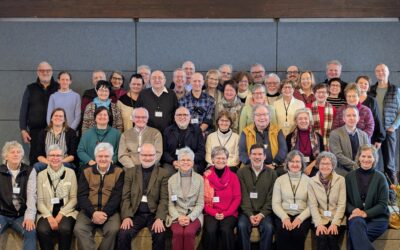 The first young woman to follow Chiara Lubich was Natalia Dallapiccola. She once shared the following episode: “One evening, we gathered around a table (the only piece of furniture that survived). Since there was no electricity, Chiara was reading by the light of a candle: “This is my command: Love each other as I have loved you. Everyone will know that you are my disciples by the love you have for each other.” Natalia continued: “Those words fell like gasoline on fire. We wanted to know what Jesus’ deepest desire was, a word that would immediately reveal precisely what he wanted of us. And here was the summarizing phrase, the great discovery of our search.” She concludes: “We said to each other: ‘And so, before going out to school, to the office, to buy something at the market; before going out to help the poor, or even to pray – we must first have among ourselves the same love that Jesus has for us. This is what He wants.’”
The first young woman to follow Chiara Lubich was Natalia Dallapiccola. She once shared the following episode: “One evening, we gathered around a table (the only piece of furniture that survived). Since there was no electricity, Chiara was reading by the light of a candle: “This is my command: Love each other as I have loved you. Everyone will know that you are my disciples by the love you have for each other.” Natalia continued: “Those words fell like gasoline on fire. We wanted to know what Jesus’ deepest desire was, a word that would immediately reveal precisely what he wanted of us. And here was the summarizing phrase, the great discovery of our search.” She concludes: “We said to each other: ‘And so, before going out to school, to the office, to buy something at the market; before going out to help the poor, or even to pray – we must first have among ourselves the same love that Jesus has for us. This is what He wants.’”

Photo ©Adriana Avellaneda
The life of prayer is the life blood for anyone who adheres to the spirituality of unity. The relationship with God is the basis of every action. But this life of prayer is also profoundly communitarian: from the songs that we sing at our shared vacations in the 1950’s in the mountains of Trent, to the modern-day musicals of Gen Verde and Gen Rosso, from our heartfelt participation in the liturgy to morning and evening prayers around the world, and in all the actions through which the Focolari actualize their “spirituality of communion”. This communion is not exhausted in intimate prayer, but is also reflected in the personal and social life. A higher measure of justice is born, an absolute for legality, as the Focolare’s “Communion and Law” branch would like to demonstrate. Chiara Lubich writes:
We have an interior life and an exterior life. Each blossoms from the other; each is the root of the other; each is the foliage of the other, on the tree of our life. The interior life is nourished by the external life. Inasmuch as I penetrate into the soul of my neighbor, so much do I penetrate into God who is within me; inasmuch as I penetrate into God who is within me, so much do I penetrate into my neighbor. God-me-neighbour: There’s an entire world here, an entire kingdom. . . (. . .) The more our love for neighbour grows, the more our love for God is increased.”
 The first young woman to follow Chiara Lubich was Natalia Dallapiccola. She once shared the following episode: “One evening, we gathered around a table (the only piece of furniture that survived). Since there was no electricity, Chiara was reading by the light of a candle: “This is my command: Love each other as I have loved you. Everyone will know that you are my disciples by the love you have for each other.” Natalia continued: “Those words fell like gasoline on fire. We wanted to know what Jesus’ deepest desire was, a word that would immediately reveal precisely what he wanted of us. And here was the summarizing phrase, the great discovery of our search.” She concludes: “We said to each other: ‘And so, before going out to school, to the office, to buy something at the market; before going out to help the poor, or even to pray – we must first have among ourselves the same love that Jesus has for us. This is what He wants.’”
The first young woman to follow Chiara Lubich was Natalia Dallapiccola. She once shared the following episode: “One evening, we gathered around a table (the only piece of furniture that survived). Since there was no electricity, Chiara was reading by the light of a candle: “This is my command: Love each other as I have loved you. Everyone will know that you are my disciples by the love you have for each other.” Natalia continued: “Those words fell like gasoline on fire. We wanted to know what Jesus’ deepest desire was, a word that would immediately reveal precisely what he wanted of us. And here was the summarizing phrase, the great discovery of our search.” She concludes: “We said to each other: ‘And so, before going out to school, to the office, to buy something at the market; before going out to help the poor, or even to pray – we must first have among ourselves the same love that Jesus has for us. This is what He wants.’” 




0 Comments